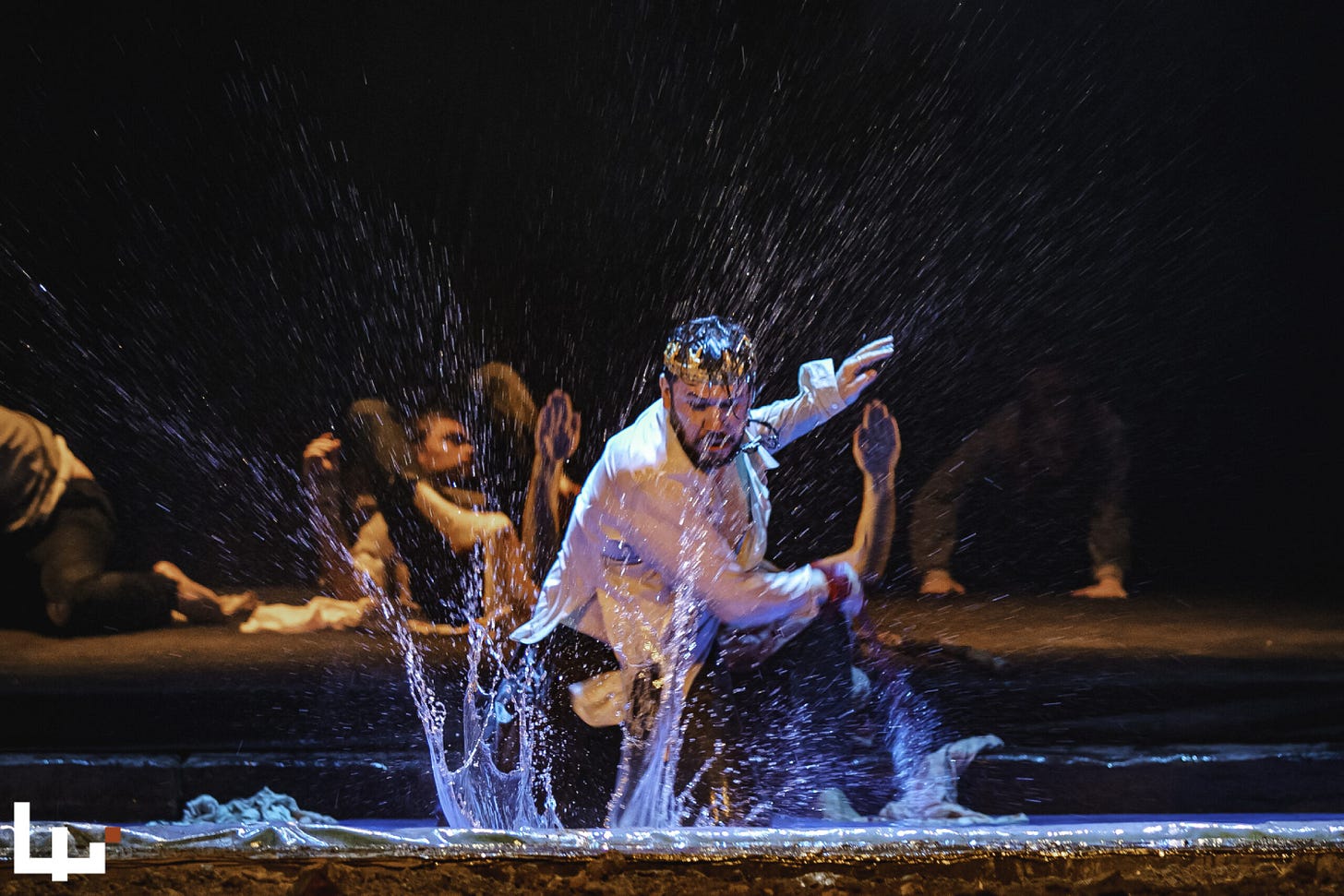ABROAD/WAY BULLETPOINTS FOR JULY 9, 2025
Rising ticket prices in the West End, Shakespeare in Ukraine, a media blitz over a Korean Tony winner in Seoul, and more
Welcome to the latest edition of ABROAD/WAY BULLETPOINTS, my regular roundup of theater headlines from around the world. New to Jaques? Check out this handy explainer.

The average lowest-price ticket on the West End jumped nearly 25% to £30.55 (~$42), according to the 2025 edition of the Stage’s annual ticketing survey. The average highest-price West End ticket hit £162.61 (~$220), a 5.2% rise over the 2024 figure. The survey collected data from all West End performances on the evening of June 28, yielding a package of stories led by a thorough breakdown of the complete data set by reporter Georgia Luckhurst — including the priciest overall ticket recorded (£353.95 [~$480] for John Lithgow headliner Giant) and the cheapest entry-level ticket price (£15 [~$20] for Harry Potter and the Cursed Child). Responding to the numbers, “Society of London Theatre and UK Theatre co-chief executive Hannah Essex insisted that a ‘snapshot based on a single performance’ could not reflect the ‘true picture of West End ticket pricing,’” pointing to the ongoing existence of “access performances, education programmes, ticket lotteries and community initiatives” throughout the year.
Producer Patrick Garvey chimes in with his own take on the numbers, reminding readers that ticket prices are unavoidably linked to the skyrocketing costs of production. “A typical West End play costs £1-£2 million (~$1.4-$2.7 million) to stage, with weekly running expenses of £120,000–£200,000 ($~160,000-$270,000). Musicals can surpass £10 million (~$13.6 million), with weekly costs between £350,000 (~$475,000) and £450,000 (~$545,000),” he writes, and then goes on to explain: “Most recently, the sector has been impacted by increased national insurance contributions, adding tens of millions of pounds to annual costs. Ticket pricing is a direct response to this.”
In his own interpretation of the data, Stage editor Alistair Smith acknowledges the challenge of rising production costs while arguing that “it will be important to keep a close eye on what happens to entry-level prices: in many ways, they are more important for the future health of the West End than what happens to the most expensive seats.”
I compared production costs between Broadway and the West End in one of this newsletter’s most popular stories:
Shakespeare is booming in Ukraine, reports Charlotte Higgins in The Guardian. In addition to the second annual Shakespeare festival in Ukrainian city Ivano-Frankivsk, “King Lear and two Othellos are in repertoire in major Kyiv theatres; there is also an A Midsummer Night’s Dream in the capital, a Hamlet, a Macbeth and a Romeo and Juliet.” By way of explanation, poet and translator Yuri Andrukhovych is quoted saying, “You can always find an intersection to Shakespeare’s world in such situations as we have. There is a big need for theater to work with existential problems: fear, hate, passion, betrayal, the human soul.” The festival’s program director Iryna Chuzhynova points out how often Shakespeare’s play have chimed with current events in Ukrainian history, and notes that this year’s festival, occuring in the third year of Russia’s invasion of Ukraine, includes some comedies but overall skews tragic. “It’s important to have a place for tears,” she says.
Hue Park, the co-creator of reigning Tony champ Maybe Happy Ending, is having a media moment in South Korea following his show’s Tony win last month. He recently met South Korean president Jae Myung Lee and took a call from Stephen Spielberg. “Park’s visit to Korea, initially intended as a quiet family reunion, quickly turned into a media frenzy as congratulations poured in for the historic achievement,” writes Mee-yoo Kwon in The Korea Times. The story includes a few tidbits about the upcoming October production of Maybe Happy Ending in Seoul, which “will preserve the original Korean script and music without the changes made for Broadway.” But the Korean producer behind that fall staging, Kyung-sook Han of NHN Link Corporation (who is also an investor in the Broadway iteration), “hinted that the technically elaborate Broadway version could also eventually reach Korean audiences, possibly by 2028, if they find a suitable venue.” The story also reveals Park’s New York ambitions for Il Tenore, another musical he co-created with Maybe Happy Ending collaborator Will Aronson: “His ultimate dream [is] to stage Il Tenore, a story featuring 24 Asian actors set in the 1930s Korea, at Lincoln Center, envisioning it as a 21st century counterpart to The King and I.”
I wrote about Park, Aronson, Maybe Happy Ending and their journey to Broadway in this post from October:
Will the new songs written for the film adaptation of Wicked spur changes to the stage musical on Broadway and beyond? That’s the question asked of Wicked composer Stephen Schwartz by Amanda Mazzei and Pedro Fagundes in Brazilian outlet CBN. The duo talk to Schwartz while there’s a popular, non-replica version of Wicked playing in São Paulo in a run extended through Aug. 10. Schwartz says changes to the Broadway stage version are unlikely, but “I would never say ‘never.’ As you probably know, this current version in São Paulo even included a snippet of something from the film that wasn’t in the play. So you never know what we might end up doing.” (Editor’s note: No, I don’t know what specific snippet he’s talking about; I’m working on finding out!) In the interview, Schwartz also discussed changes to Nessarose’s story in the film, following discussions about the character, who uses a wheelchair, with real-life people with disabilities.
The award-winning Death Note musical will return to Tokyo this winter for a 10th anniversary staging. As noted by Japanese entertainment news outlet Crank-in!, the Frank Wildhorn musical, based on the megahit manga and anime of the same name, premiered in Japan in 2015 (and returned in 2017 and 2022), and has also played three runs in South Korea, where the 2022 production won the top Korean theater award for best musical.
I spoke with Wildhorn about Death Note in a wide-ranging conversation about his journey to becoming one of the most popular musical theater creators in the world:
You’re not imagining it: The Canadian musical Come From Away really is playing all over the world right now. I’ll have more on that in next week’s SPOTLIGHT STORY, but in the meantime:
Aisling Murphy of the Toronto paper The Globe and Mail went to the Muny theater—a venerable institution in St. Louis, Mo., that produces musicals in an 11,000-seat, outdoor venue—to check out a recent, non-replica staging of Come From Away. “At the Muny, the story feels less about Canada and more about humankind,” she writes. “Here, jokes about Tim Hortons and road-blocking moose, usually big punchlines when the show plays north of the border, function more as scenery for the events of the story. References to being queer in a small town, meanwhile, and feeling out the limits of small talk when surrounded by southern Americans, land with a more immediately resonant heft.” She concludes: “All in, the Muny’s production of Come From Away—which, conservatively speaking, will play to at least 50,000 people … signals a promising future for a show that in the last decade has all but defined Canadian musical theater.”
Meanwhile, writer JC Gotinga has a fascinating review in Filipino outlet The Rappler about seeing the current Manila production of Come From Away on the day the U.S. bombed Iran. “We’re not about to talk politics here; the events of that day just emphasize, in a rather troubling way, the message of Come From Away. If anyone finds trite the telling of stories of ordinary human kindness in extraordinary circumstances, then one needs only to check the news to see that human kindness has yet to deal a final blow to human malevolence,” Gotinga writes, adding: “This unassuming musical performed by a cast that identifies none of its individuals as the star or the headliner, double underscores the necessity and beauty of community. … The medium is the message: It will only work if we work together.”
AND ICYMI
Last week’s SPOTLIGHT STORY about India has turned out to be very popular with Jaques readers both longtime and new. Here’s what you missed last week:
EYE ON INDIA
A booming economy, a fancy new venue, and all the reasons the world's most populous nation could become the next major theater market.







